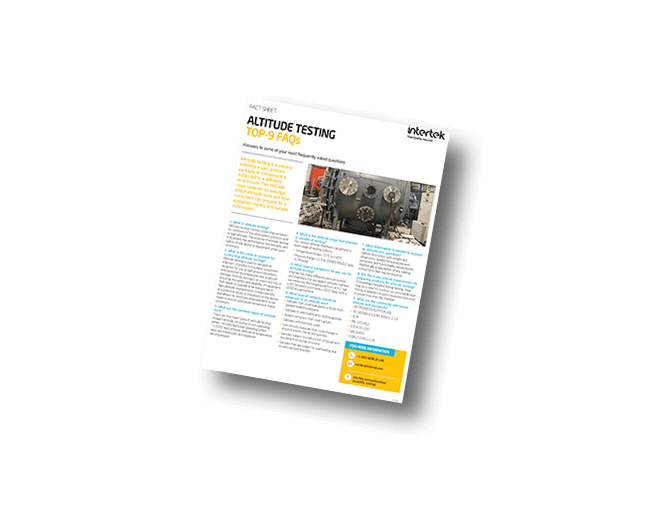Altitude Testing Services
What is Altitude Testing?
Altitude testing simulates high and low atmospheric pressure conditions to evaluate the performance, safety, and reliability of products intended for use at higher altitudes. Whether your product is destined for high-altitude automotive use, aerospace applications, or other extreme environmental conditions, Intertek’s altitude testing capabilities ensure it meets rigorous standards for durability and compliance.
Why Altitude Testing Matters
Products exposed to high altitudes face unique challenges, including:
- Reduced cooling efficiency
- Increased risk of electrical arcing
- Material expansion and contraction
- Pressure-induced mechanical stress
Altitude testing helps to identify failure modes early, reduce warranty risks, and ensure product reliability in demanding environments.
Industries and Applications
Intertek's altitude testing services support a wide range of industries and applications, including:
- Automotive components and systems
- Aerospace and defense electronics
- EV battery and charging systems
- Consumer electronics and packaging
- Industrial and medical devices
Testing can be performed in accordance with standards such as MIL-STD-810G, IEC 60068-2-13, and custom protocols tailored to your product’s intended environment.
Intertek Capabilities
Our altitude testing chambers and systems offer:
- Altitude Simulation: Up to 82,000 ft (25,000 m)
- Temperature Control: -100°C to +200°C
- Large Work Area: For example, a platform at 41” tall x 46” between posts wide x 56.5” deep with a 2000 lb payload limit.
- Custom Test Profiles: For transient or steady-state conditions
Compliance and Certification
Altitude testing is often required for compliance with:
- MIL-STD-810G
- IEC 60068-2-13
- RTCA DO-160
- OEM-specific automotive and aerospace standards
Intertek Advantage
With decades of experience in environmental simulation, Intertek offers:
- Accredited ISO/IEC 17025 testing
- Fast turnaround and flexible scheduling
- Expert engineering consultation
- Global market access support
Altitude testing is a process whereby a part, product, package, or component is subjected to a different air pressure. This FAQ covers common knowledge about altitude tests and how customers can prepare for a quotation inquiry and sample submission.
Knowledge Center
Master FMVSS 108 Compliance – Download the Expert Guide
Automotive Functional Safety & Cyber Security FAQs
Development of Driveline Electrification Technologies White Paper
Understanding Failure Analysis and Answering your Frequently Asked Questions
The Top-7 FAQs of Autonomous Vehicles Testing
The Top-10 FAQs of Advanced Composites Testing
The Top-10 FAQs of Automotive Interior Testing
Accelerated Stress Testing to Manage Disruptive Market Changes Webinar
Transitioning to Structural Composites to Meet CAFE Standards
Automotive Interiors Testing White Paper
Resources
Global Research & Certification
SatelliteTM Client Test Program
Engineering and Technical Staffing
SupplyTek - gain the confidence to go to market faster
Protek - safeguard people, systems and processes, facilities, materials and surfaces, and products

